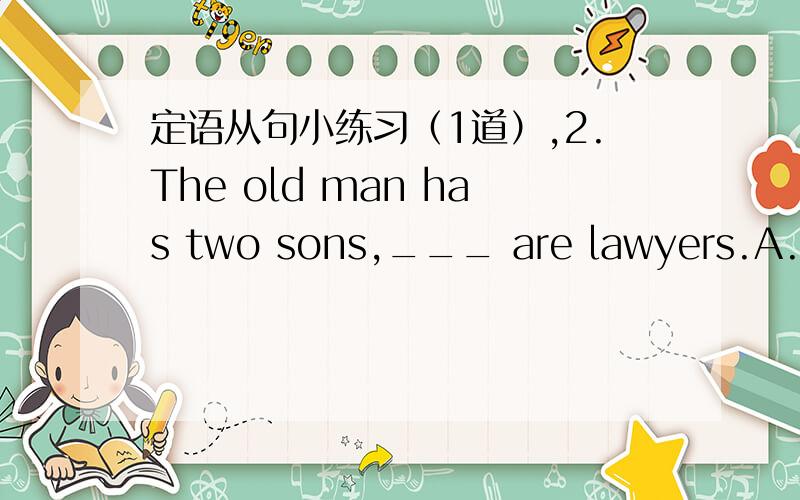定语从句小练习(1道),2.The old man has two sons,___ are lawyers.A.both of them B.both of who C.both of whom D.both of they我知道应该在B和C中选,怎么选呢?
来源:学生作业帮助网 编辑:作业帮 时间:2024/11/05 14:27:26

定语从句小练习(1道),2.The old man has two sons,___ are lawyers.A.both of them B.both of who C.both of whom D.both of they我知道应该在B和C中选,怎么选呢?
定语从句小练习(1道),
2.The old man has two sons,___ are lawyers.
A.both of them B.both of who C.both of whom D.both of they
我知道应该在B和C中选,怎么选呢?
定语从句小练习(1道),2.The old man has two sons,___ are lawyers.A.both of them B.both of who C.both of whom D.both of they我知道应该在B和C中选,怎么选呢?
选B.
这一句改宾语改单数就好理The old man has a son, who is a lawyer.
然后再把上句改成复数宾语,就变成:
The old man has two sons, (both of )who are lawyers.
both of 可以省掉的.
其他答案的话,试着把both of 省掉,立刻就发现为什么不能选了.
补充:二楼三楼说用whom,在这一句是不行的.如用whom,则说明其是从句谓语动词的逻辑宾语,但这里显然不是.
用whom的例句:
The old man has two sons, (both of) whom he loves deeply. 老人有两孩子,都让他很疼爱.
这时候就该用whom了,因为在逻辑上是作为疼爱love的宾语.
应该是选B吧
--who作为从句中的主语,而且只要用whom的地方一般也都能用who哦,反之就不可以了
选C为好,因为是定语从句,A和D不考虑了。不论是选B还是C,那个词表示的都是前面的sons,这个没问题吧。如果没有both of,自然选who了,但是多了of 这里是介词,介词后面的接宾语,所以whom为好,就像most of us,而不是most of we一样。
who虽然理论上可以做宾语,但没有whom好。实际上外国人认为B和C都正确,但是他们能用whom的就不用who,这是习惯。在...
全部展开
选C为好,因为是定语从句,A和D不考虑了。不论是选B还是C,那个词表示的都是前面的sons,这个没问题吧。如果没有both of,自然选who了,但是多了of 这里是介词,介词后面的接宾语,所以whom为好,就像most of us,而不是most of we一样。
who虽然理论上可以做宾语,但没有whom好。实际上外国人认为B和C都正确,但是他们能用whom的就不用who,这是习惯。在中国就只有一个正确答案,C。
收起
C